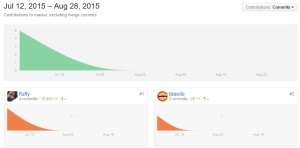Jonathan Rosenberg recently posted on Cisco Blog for the release of the project Thor codec to the community some weeks ago (link to Thor project). The effort is being staffed by some of the world’s most foremost codec experts, including the legendary Gisle Bjøntegaard and Arild Fuldseth, both of whom have been heavy contributors to prior video codecs. Cisco decided to open source the code, which is available on http://thor-codec.org. Moreover, Thor was contributed as an input to the Internet Engineering Task Force (IETF) (contribution available here, Presentation slides available here), which has begun a standards activity to develop a next-gen royalty free video codec in its NetVC workgroup.
More documents on IETF NetVC are available also here.
As Jonathan describes, the patent licensing situation for H.265 is dependent on two distinct patent licensing pools that have formed so far, and unfortunately many license holders are not represented in either. On the contrary, for the case of H.264 there is only one license pool, which make H.264 much cheaper than H.265, where the total costs to license H.265 from these two pools is up to sixteen times more expensive than H.264, per unit. Moreover, H.264 had an upper bound on yearly licensing costs, whereas H.265 has no such upper limit, while at the same time the licensing terms preclude usage of H.265 in any kind of open source or freely distributed software application, such as web browsers.
Jonathan invites others to work on Thor by contributing to the codec development or contributing their own Intellectual Property Rights on a royalty free basis (you may contact netvc-inquiry@cisco.com).
Although activity graphs from github are not really encouraging for the community involvement (see figure below) and that there are many basic features that are not implemented yet, the project progress may be ambitious within 2015, however the project is still promising.
The main Thor-exclusive feature is the 64×64 super block, which provide significant better performance for specific video content types according to the provided performance comparison data (available here).
Summarizing, we may say that currently Thor is a parallel draft to Daala. Daala is the code-name for a new video compression technology promoted by a collaboration between Mozilla Foundation, Xiph.Org Foundation and other contributors. The goal of Daala is to provide a free to implement, use and distribute digital media format and reference implementation with technical performance superior to H.265. IETF may standarddize only one codec within the NetVC activity, therefore the competition for the one codec to prevail will be very tough. Initial comparison to Daala is available (here) but it will be interesting to close monitor the performance competition between the two codecs in the next months.

